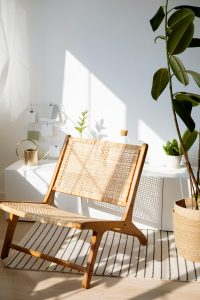Rattan has long been one of Indonesia’s most iconic natural materials. Flexible, resilient, and aesthetically versatile, it has been used for centuries in furniture, handicrafts, and home décor. Among its many applications, the rattan chair is both functional and symbolic—balancing craftsmanship, nature, and design. Indonesia isn’t just a producer of rattan; many of the world’s rattan chairs are either designed, manufactured, or inspired by makers here.
Historical Background & Geographical Roots
Origins and craft heritage: Rattan weaving in Indonesia isn’t a modern invention. It is a tradition cultivated across multiple islands (Java, Kalimantan, Sumatra, etc.), where rattan grows abundantly. Artisans in communities have passed down weaving and bending techniques over generations.
Regional clusters: Certain areas have high concentrations of rattan craftsmanship. For instance, Cirebon in West Java is known for its large number of workshops and factories focused on rattan chairs and similar furniture.
Industrialization and export: In the past few decades, companies large and small have shifted from cottage-level production to factories with export capability, blending handmade techniques with machine assistance. Such companies often supply to retailers, hospitality projects, and international wholesalers.
Strengths of Indonesian Rattan Chair Manufacturers
- Abundance of raw material
Indonesia reportedly supplies a large proportion of the world’s natural rattan. This gives local manufacturers better access to rattan poles, cores, and strips, which helps with cost, supply stability, and experimentation with different grades/types. - Skilled craftsmanship and tradition
The weaving, bending, and shaping of rattan are labour-intensive skills. Many manufacturers still rely heavily on artisanal skills. This tradition ensures high levels of detail, flexibility in custom design, and the ability to produce both rustic/traditional and sleek/contemporary styles. - Design versatility
Because rattan is flexible, lightweight, and aesthetically neutral, it can be shaped into many styles—from classic colonial, mid-century, boho, modern minimal, to more avant-garde furniture design. Indonesian makers have been innovating with color, finish, combining with other materials etc. - Sustainability appeal
Rattan grows relatively fast compared to slow-growing hardwoods. When harvested correctly, it’s renewable. Many manufacturers use eco-friendly treatments, legal sourcing systems, and environmentally respectful practices. In global markets, this aligns with buyer demand for ethically and sustainably sourced furniture. - Export infrastructure & government support
Indonesian manufacturers have experience with export compliance (customs, quality control) and there is institutional support (trade fairs, SME programs, regulatory frameworks). This helps manufacturers get their chairs into global retail channels.
Opportunities & Trends
- Design innovation & collaborations
Designer‐led experiments (e.g. new finishes, coloring techniques like “karuun“, hybrid designs combining rattan with metal or wood) are raising the profile of Indonesian rattan in global design shows. - Sustainable & ethical credentials as selling points
As consumers globally care more about environmental impact, traceability, and fair labor, Indonesian rattan manufacturers who can credibly present these features have an edge. - Niche & premium markets
High-end furniture, boutique hotels, resorts, and specialty interior design projects are less price-sensitive and more style-sensitive. These markets value craftsmanship, authenticity, uniqueness. - Domestic market growth
As Indonesia’s middle class grows, there is more domestic demand for quality furniture—not just cheap pieces. This could help manufacturers balance export and local sales, reduce dependence on export markets alone. - Technology and process improvements
Leaner production, combining machine assistance and finishing with artisanal weaving, improved logistics, better supply chain management, and possibly leveraging digital tools (for designing, marketing, order management) are all potential extensions.
Rattanmeuble.com as one of Rattan Chair Exporter in Indonesia also export its products worldwide and welcome customize order from client.


Recent Comments